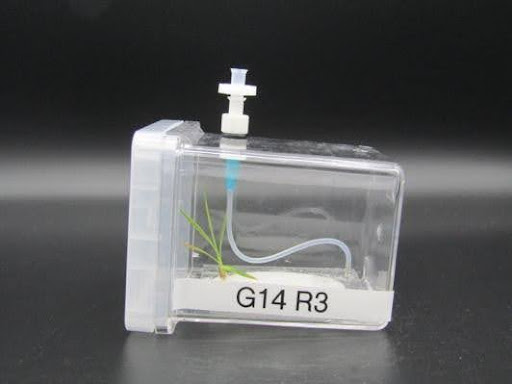Bacterial inoculation while transplanting coupled with a later harvesting time point yields a reproducible microbial community
The Science

Increasing pressure on agricultural systems and environmental degradation has created a need to examine new methods for developing sustainable agricultural practices, such as microbial inoculants to replace or supplement fertilizers. Studying plant-microbe-soil interactions is challenging due to their complexity and the inherent variability of natural ecosystems. While fabricated ecosystems provide an opportunity to replicate aspects of these systems with reduced complexity and enhanced control, inoculation can introduce significant variation. m-CAFEs researchers evaluated how different bacteria inoculation practices and plant harvesting time points affect the reproducibility of a synthetic microbial community in association with the model grass Brachypodium distachyon.
Impact
This project provides a benchmark for understanding how inoculation practices impact the colonization and retention of a microbial community by the plant root. By combining defined systems (the EcoFAB, a model plant, and a model community), ENIGMA researchers have shown that this complex but defined plant-microbe-ecosystem delivers reproducible results. Scientists can now use this system in the lab to parse the molecular mechanisms underlying how microbes can shape the growth of grasses.
Summary
In this work, researchers evaluated how three different bacteria inoculation practices (seed, transplant and seedling inoculation) and two plant harvesting time points (14-day-old plants and 21 days post-inoculation) affected a synthetic microbial community (SynCom) in association with the model grass Brachypodium distachyon in fabricated ecosystems (EcoFabs). Inoculation while transplanting, coupled with a later harvesting time point, produced the most reproducible microbial community in the EcoFAB – B. distachyon – SynCom ecosystem. This combination of methods could serve as a standardized protocol for using fabricated ecosystem experimental systems.
Researchers also found that the isolate Burkholderia_OAS925 efficiently outcompeted the otherSynCom species and competitively colonized Brachypodium distachyon plant roots. When a plant was not present in the system,Variovorax_OAS795 dominated the microbial community.
Contact

Jenny C. Mortimer Lawrence Berkeley National Lab jenny.mortimer@adelaide.edu.au
Funding
This material by m-CAFEs Microbial Community Analysis & Functional Evaluation in Soils (m-CAFEs@lbl.gov), a SFA led by Lawrence Berkeley National Laboratory, is based upon work supported by the U.S. Department of Energy, Office of Science, Office of Biological & Environmental Research.
Publications
Lin, H.-H.; et al. “Impact of inoculation practices on microbiota assembly and community stability in a fabricated ecosystem.” Phytobiomes Journal (2023) [DOI:10.1094/PBIOMES-06-23-0050-R] OSTI: 2203547
